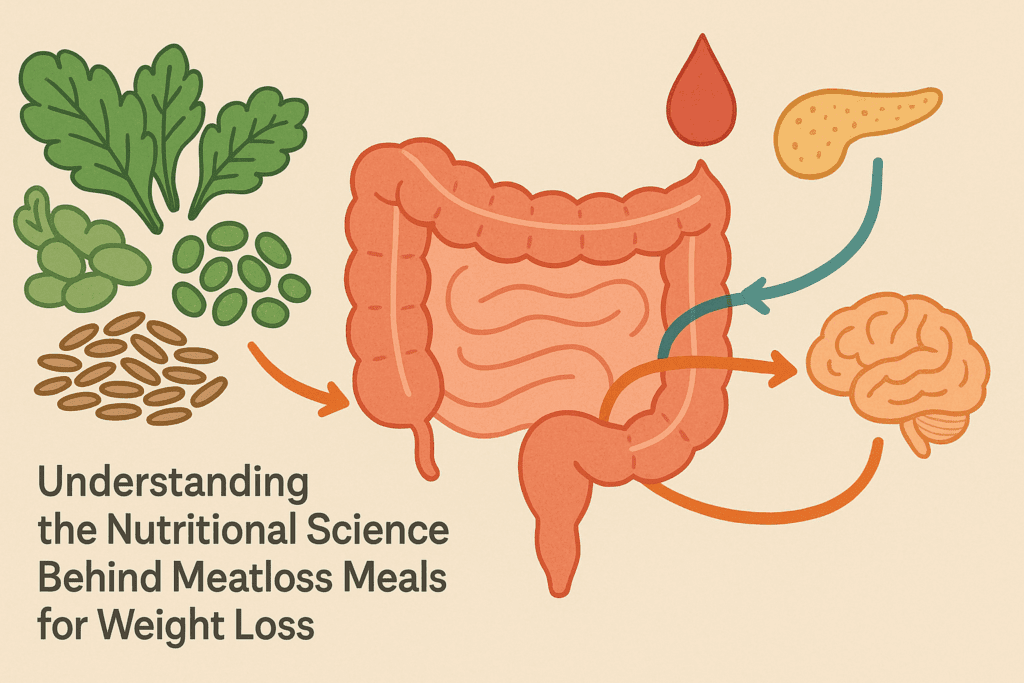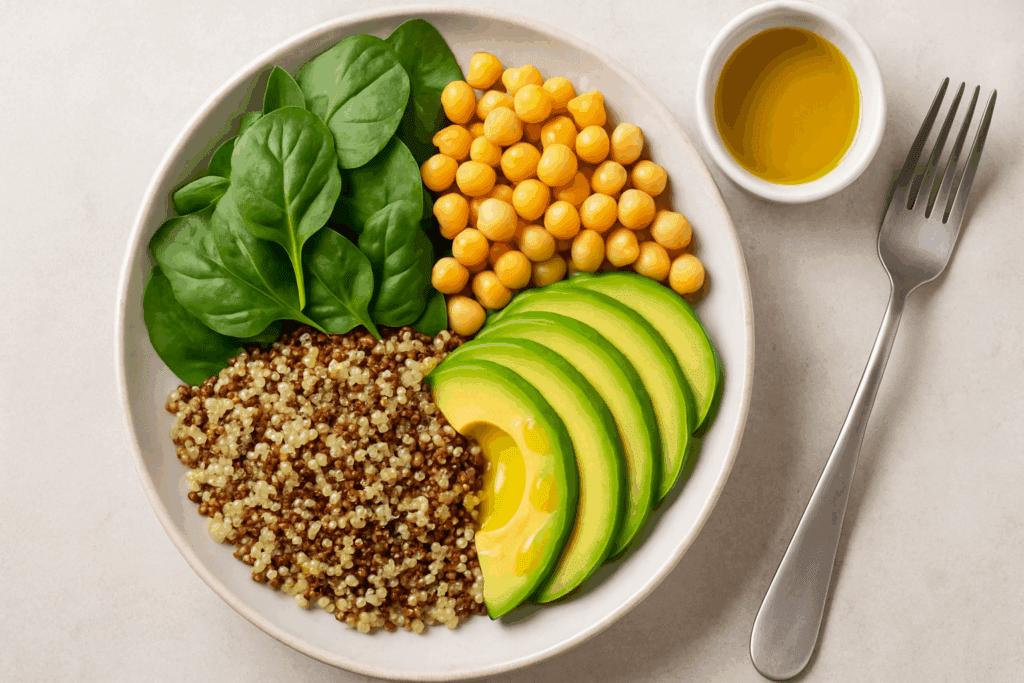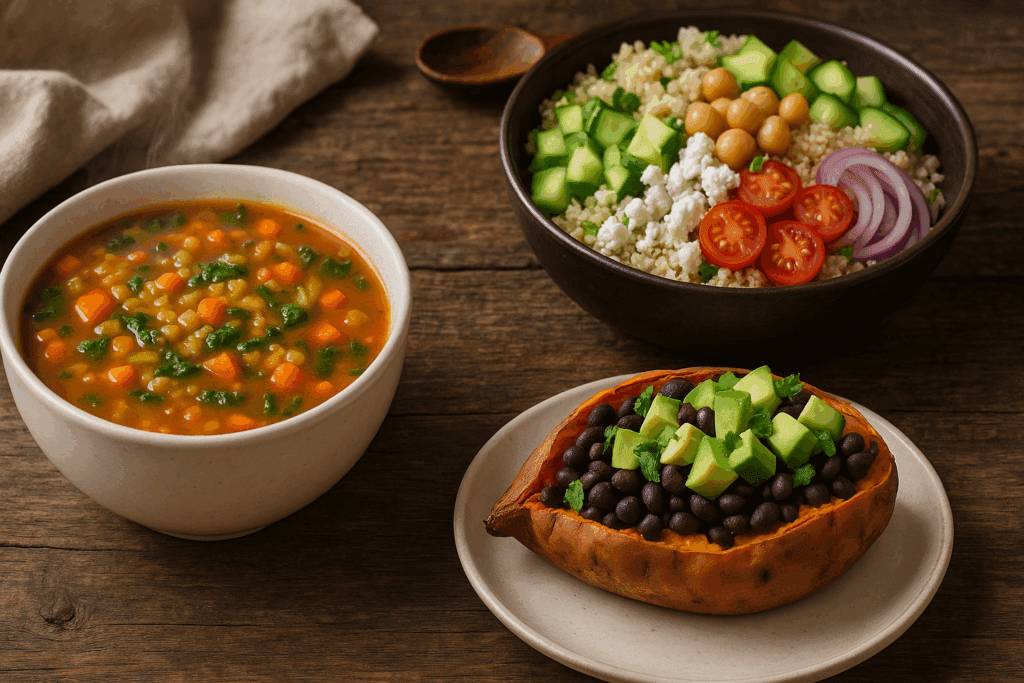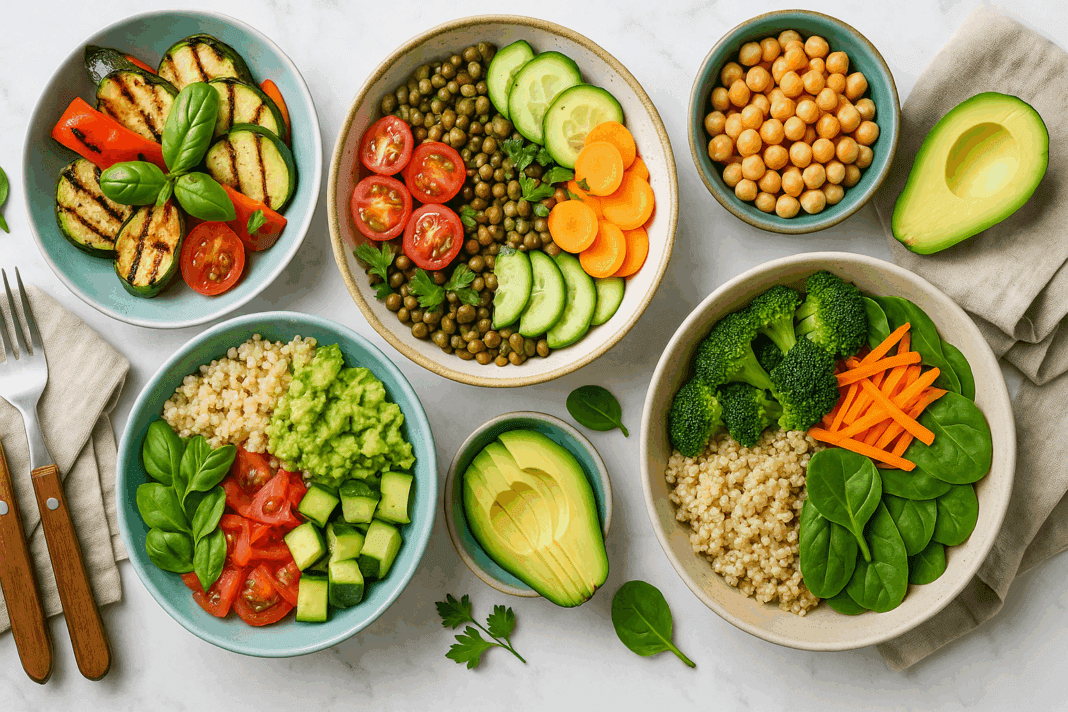In a world saturated with diet trends and quick-fix weight loss plans, one nutritional approach continues to earn the trust of researchers, physicians, and dietitians alike: the power of plant-based eating. Vegetarian meals for weight loss don’t just promote shedding excess weight—they support metabolic health, gut balance, and long-term well-being. The truth is, effective weight management doesn’t require extreme restriction or boring, repetitive meals. Instead, a smart, well-balanced vegetarian diet built around whole foods can help you lose weight naturally while keeping your meals flavorful and satisfying.
What makes vegetarian weight loss recipes particularly effective isn’t just what they eliminate—like red meat or heavily processed animal fats—but what they include. Legumes, leafy greens, whole grains, nuts, seeds, and colorful vegetables provide the fiber, antioxidants, and phytonutrients your body needs to thrive. These ingredients not only support natural weight loss but also reduce inflammation, improve digestion, and help stabilize blood sugar. When done right, healthy vegetarian recipes for weight loss can be both delicious and deeply nourishing, helping you shed pounds without sacrificing satisfaction or nutrition.
You may also like: Smart, Simple Recipes for a Balanced Diet: Expert-Backed Healthy Food Dishes to Support Everyday Wellness

Why Vegetarian Meals Support Natural Weight Loss
One of the most compelling reasons people turn to vegetarian eating for weight loss is the emphasis on low-calorie, high-volume foods. Vegetables, fruits, legumes, and grains provide essential nutrients while being naturally low in calories and high in fiber. This makes it easier to feel full and satisfied while consuming fewer total calories—a critical factor in any successful weight loss plan. Unlike highly processed foods that are dense in calories but light on nutrition, vegetarian meals are built around nutrient-rich ingredients that promote satiety and digestive efficiency.
A key mechanism behind the effectiveness of vegetarian meals for weight loss is their influence on energy density. Foods like lentils, leafy greens, and sweet potatoes have fewer calories per gram than meats, cheeses, or oils, allowing you to eat larger portions without over-consuming energy. Additionally, these foods often take longer to chew and digest, which encourages mindful eating and reduces the tendency to overeat.
Scientific studies continue to support the link between vegetarian diets and lower body mass index (BMI). People who regularly consume healthy veggie meals to lose weight are more likely to maintain a healthy body weight over time, especially when their meals focus on whole foods rather than refined carbohydrates or processed meat substitutes. The combination of fiber, plant protein, and micronutrients fosters a favorable hormonal environment for fat loss, particularly when combined with regular movement and good sleep hygiene.

Understanding the Nutritional Science Behind Meatless Meals for Weight Loss
The success of meatless meals for weight loss can be explained not only by calorie reduction but by their positive impact on hormonal balance and metabolic function. Fiber plays a critical role in regulating hormones such as ghrelin and leptin—those responsible for signaling hunger and fullness. High-fiber vegetarian meals slow digestion, improve insulin sensitivity, and help keep blood sugar levels stable, all of which contribute to healthy weight regulation.
Moreover, many plant-based foods contain bioactive compounds that assist in breaking down fat and reducing chronic inflammation. For example, cruciferous vegetables like broccoli and cauliflower are rich in glucosinolates, which support liver detoxification and may play a role in fat metabolism. Legumes like black beans and lentils offer resistant starch and protein, which keep you fuller longer while feeding the beneficial gut bacteria that influence body weight and mood.
Protein is often a concern when discussing vegetarian diet recipes to lose weight, but it need not be. A combination of legumes, soy-based products like tofu and tempeh, nuts, seeds, and whole grains can easily meet daily protein needs when meals are thoughtfully prepared. Studies show that plant protein sources are just as effective in preserving lean muscle mass during weight loss when they are consumed in adequate amounts and combined with resistance training.

Constructing Balanced and Satisfying Vegetarian Meals for Weight Loss
Creating weight loss vegetarian diet recipes that are both nutritious and satisfying comes down to balance. A well-rounded plate should contain fiber-rich vegetables, lean plant-based protein, healthy fats, and complex carbohydrates. This balance helps to stabilize blood sugar levels, keep hunger at bay, and support steady energy throughout the day.
Start with a generous portion of non-starchy vegetables like spinach, bell peppers, zucchini, or cauliflower. These provide volume, fiber, and important micronutrients with minimal calories. Add in a solid protein source such as chickpeas, lentils, tempeh, or edamame. Protein not only supports metabolism but is essential for preserving muscle tissue during weight loss.
For your carbohydrate base, opt for whole grains like quinoa, farro, barley, or brown rice. These slow-digesting carbs release energy steadily and pair well with vegetables and legumes. A small portion of healthy fats—from avocado slices, tahini, olive oil, or nuts—rounds out the meal by supporting hormone health and enhancing nutrient absorption.
Flavor is key to sustainability, so don’t shy away from spices, herbs, vinegars, or lemon juice to bring your meals to life. The more satisfying your food tastes, the more likely you are to stay on track without feeling restricted. Healthy vegetarian recipes for weight loss can be deeply enjoyable when built with fresh, flavorful, and nutrient-dense ingredients.

Easy and Effective Vegetarian Weight Loss Recipes You’ll Love
Delicious meals can make or break your ability to stick to a weight loss plan, which is why it’s so helpful to have a rotation of easy vegetarian weight loss recipes that you genuinely enjoy. One excellent option is a hearty lentil and vegetable soup made with onions, carrots, garlic, and kale. This meal is not only filling but packed with iron, fiber, and antioxidants, making it ideal for cool evenings or meal prep.
Grain bowls are another flexible, customizable way to enjoy healthy veggie meals to lose weight. A Mediterranean-inspired version might include quinoa, cherry tomatoes, cucumber, kalamata olives, hummus, and grilled eggplant, while an Asian-style bowl could feature brown rice, tofu, shredded cabbage, carrots, edamame, and sesame dressing.
For a lighter meal, try a roasted sweet potato stuffed with black beans, avocado, and salsa. It’s quick, full of flavor, and offers a satisfying mix of complex carbs, healthy fats, and plant protein. Even smoothies can serve as a smart meal replacement if constructed properly. Blend frozen berries, spinach, half a banana, flaxseeds, and unsweetened soy milk for a fiber-rich, nutrient-dense drink that fuels your body without spiking blood sugar.
Each of these vegetarian weight loss recipes demonstrates that you don’t have to sacrifice taste or creativity to meet your health goals. With a few reliable staples and a willingness to explore new ingredients, the possibilities are nearly endless.

How Vegetarian Diets Help Prevent Plateaus and Boost Long-Term Success
One of the biggest challenges with traditional dieting is the inevitable plateau—where weight loss stalls and frustration sets in. Fortunately, vegetarian meals for weight loss offer tools to help break through these plateaus by promoting metabolic flexibility and reducing inflammation, which are key contributors to slowed progress.
Unlike many calorie-restrictive diets that can slow metabolism over time, whole-food vegetarian diets nourish your body with the vitamins, minerals, and antioxidants needed for efficient cellular function. This improves mitochondrial performance (the energy centers of your cells), hormone balance, and detoxification—all of which are essential for sustained fat loss.
Weight loss vegetarian diet recipes also tend to promote consistent meal patterns and blood sugar stability. This reduces the likelihood of cravings, binge eating, or emotional eating that often derail traditional weight loss efforts. When meals are rich in fiber and contain balanced macronutrients, they naturally keep you fuller longer and help reset your appetite regulation systems.
Even better, vegetarian diets are easier to maintain in the long term because they don’t rely on extreme restrictions. You can continue enjoying a wide range of foods—soups, stews, pasta dishes, salads, smoothies, wraps—without feeling bored or deprived. That variety is critical for staying engaged, motivated, and ultimately, successful.
Addressing Common Concerns About Protein and Energy on a Vegetarian Diet
It’s natural to have questions when switching to meatless meals for weight loss—especially regarding protein intake and energy levels. But with proper planning, a vegetarian diet can easily meet your nutritional needs while supporting healthy body composition and sustained energy.
Protein doesn’t have to come from meat. Lentils, black beans, tofu, tempeh, seitan, peas, and quinoa all contribute valuable protein to your daily intake. When meals are built around a variety of these sources, they collectively provide all essential amino acids your body needs for tissue repair and muscle maintenance.
Energy levels often improve on a well-planned vegetarian diet, thanks to the high antioxidant content and slow-digesting carbs found in whole plant foods. These nutrients support healthy adrenal and thyroid function, improve blood sugar regulation, and protect against energy-draining inflammation. By pairing carbohydrates with protein and healthy fats at each meal, you can avoid energy crashes and stay focused throughout the day.
If you’re physically active, boosting your intake of protein-rich snacks—like roasted chickpeas, hummus with veggies, or nut butter on whole-grain toast—can keep you fueled before and after workouts. And if needed, plant-based protein powders can be added to meals for an extra nutritional punch.

The Psychological Edge of Healthy Veggie Meals to Lose Weight
Beyond the physical benefits, vegetarian eating also supports mental clarity, emotional stability, and a more positive relationship with food. Plant-based meals encourage mindfulness by requiring a closer connection to ingredients, preparation methods, and portion control. This naturally reduces impulsive eating and increases awareness of hunger and fullness signals.
Additionally, many people find vegetarian eating to be emotionally satisfying. Whether motivated by health, sustainability, or animal welfare, aligning food choices with personal values creates a deeper sense of purpose and motivation. When your eating habits reflect your ethics and aspirations, it’s easier to stay committed and feel good about your progress.
Healthy vegetarian recipes for weight loss are colorful, varied, and full of flavor—which reduces the sense of restriction that causes so many diets to fail. Instead of focusing on what you can’t have, you’re inspired by what you can create. This shift in mindset—from scarcity to abundance—is one of the most powerful tools for sustainable transformation.
Frequently Asked Questions: Smart and Satisfying Vegetarian Meals for Weight Loss
1. How can I customize vegetarian meals for weight loss to support hormonal balance?
Many people overlook the role that hormonal health plays in weight management, especially on a plant-based diet. Vegetarian meals for weight loss can be tailored to support hormones like insulin, cortisol, and leptin by emphasizing key nutrients. For instance, magnesium-rich foods such as dark leafy greens and pumpkin seeds help regulate cortisol, while high-fiber legumes improve insulin sensitivity. Including flaxseeds in your vegetarian weight loss recipes may also support estrogen balance due to their lignan content, which is especially helpful for women during perimenopause or menopause. Carefully chosen veggie meals to lose weight can address both metabolic and hormonal concerns, leading to better long-term success.
2. Are there ways to make meatless meals for weight loss more effective for intermittent fasting?
Absolutely. Intermittent fasting can pair well with meatless meals for weight loss when meals are planned to be nutrient-dense and balanced. Because fasting reduces the eating window, it becomes even more important to include high-quality vegetarian protein sources like tempeh, lentils, or quinoa. These ingredients should be incorporated into weight loss vegetarian diet recipes that provide complex carbohydrates, fiber, and healthy fats to sustain energy during fasting periods. You can also use smoothies packed with spinach, chia seeds, and almond butter as nutrient-rich first meals to break a fast effectively. Vegetarian diet recipes to lose weight work synergistically with fasting when meals are thoughtfully crafted to support nutrient sufficiency.
3. What are some overlooked ingredients that enhance healthy vegetarian recipes for weight loss?
Some powerful plant-based ingredients rarely featured in mainstream recipes can greatly enhance the effectiveness of vegetarian meals for weight loss. Sea vegetables like dulse and wakame are high in iodine and support thyroid health, which plays a central role in metabolism. Spices such as turmeric and cayenne can boost thermogenesis, slightly increasing calorie burn. Fermented foods like kimchi and miso improve gut health, which is increasingly linked to weight regulation. Including these in vegetarian weight loss recipes not only introduces new flavors but also adds metabolic benefits that go beyond calories. These additions help elevate veggie meals to lose weight into functional nutrition.
4. How do I maintain energy levels throughout the day on a vegetarian weight loss plan?
Energy dips are a common concern when starting a plant-based diet, especially if meals are improperly balanced. To maintain energy, it’s important to ensure that healthy vegetarian recipes for weight loss contain complex carbohydrates paired with protein and fat. For example, pairing a chickpea salad with olive oil and sweet potatoes offers both slow-burning fuel and satiety. Timing also matters—eating every 4–5 hours and avoiding skipping meals can help regulate blood sugar. Unlike quick fixes from caffeine or sugar, strategically planned vegetarian diet recipes to lose weight offer consistent energy without crashes, especially when iron, B12, and omega-3s are prioritized.
5. What are the social and psychological benefits of adopting a vegetarian weight loss approach?
Beyond the physical transformation, many people report improved mental clarity and emotional satisfaction when switching to vegetarian meals for weight loss. There’s a psychological benefit to aligning your lifestyle with your values, whether it’s for health, ethics, or sustainability. Socially, plant-based eating can also foster community, especially as interest in meatless meals for weight loss continues to rise globally. Cooking and sharing vegetarian weight loss recipes can become a creative and bonding experience, reducing the isolation sometimes associated with dieting. These emotional connections and a renewed sense of purpose can strengthen adherence to veggie meals to lose weight over the long haul.
6. Can vegetarian weight loss recipes support athletic performance and muscle preservation?
Yes, with proper planning, vegetarian weight loss recipes can absolutely support muscle retention and athletic goals. Plant-based proteins such as lentils, tofu, edamame, and soy milk offer complete or complementary amino acid profiles. Post-workout recovery meals can include weight loss vegetarian diet recipes that combine carbs and proteins, like a quinoa bowl with black beans and avocado. For strength training, adding high-protein snacks or a plant-based protein shake helps prevent muscle breakdown. A consistent intake of healthy veggie meals to lose weight also contributes antioxidants, which reduce exercise-induced inflammation and improve recovery time, supporting athletic performance without animal products.
7. How do I manage cravings when transitioning to veggie meals to lose weight?
Cravings are often the result of nutritional deficiencies, blood sugar imbalances, or emotional triggers. One way to reduce cravings on a vegetarian plan is to ensure your meals are satisfying and include all macronutrients. Vegetarian meals for weight loss that lack fat or protein may leave you feeling unsatisfied, increasing your likelihood of reaching for processed snacks. Including crunchy vegetables, complex carbs, and umami flavors—such as tamari, miso, or sun-dried tomatoes—can provide the sensory satisfaction you need. Additionally, having access to delicious, prepared meatless meals for weight loss can prevent impulsive choices by making healthy food the most convenient option.
8. Are there cultural or global approaches to vegetarian diet recipes to lose weight?
Yes, many traditional cuisines offer vegetarian-friendly dishes that naturally support weight loss. Indian dal made with lentils, spices, and vegetables is protein-rich and deeply nourishing. Ethiopian cuisine often features injera and vegetable stews, while Thai food includes dishes like papaya salad and tofu curry that fit well into healthy vegetarian recipes for weight loss. Adopting an international perspective can diversify your meal options and prevent boredom, making the lifestyle more enjoyable. Exploring these cultural versions of vegetarian weight loss recipes introduces new ingredients and spices that make your meals both flavorful and sustainable.
9. How can I meal prep effectively using vegetarian meals for weight loss?
Meal prepping doesn’t have to be complicated. Start by choosing two to three core vegetarian weight loss recipes you enjoy and prepare them in larger batches. Store meals in glass containers, keeping sauces and dressings separate to preserve freshness. Use versatile components like cooked quinoa, baked tofu, or roasted vegetables that can be repurposed into salads, wraps, or bowls. Incorporating meatless meals for weight loss into your weekly prep ensures you always have healthy choices available, which minimizes impulsive eating. Smart prep strategies make veggie meals to lose weight practical for even the busiest schedules.
10. What innovations are emerging in plant-based nutrition to support weight loss goals?
The world of plant-based nutrition is evolving rapidly, with innovations tailored to those pursuing weight loss. New high-protein legumes like lupini beans are gaining attention for their low carb and high fiber content. Advanced plant-based protein powders now contain blends of pea, hemp, and fermented grains to improve absorption. Additionally, AI-powered meal planning tools are helping users create personalized vegetarian diet recipes to lose weight based on their metabolic data and preferences. These tools not only boost success rates but also make healthy veggie meals to lose weight more accessible and science-driven. As the industry grows, expect even more targeted solutions for sustainable weight management through plant-based eating.
Conclusion: Embracing Vegetarian Meals for Sustainable and Satisfying Weight Loss
If you’re ready to embrace a healthier lifestyle without relying on crash diets or bland food, vegetarian meals for weight loss offer a powerful, evidence-based solution. By centering your meals around whole, plant-based ingredients, you can enjoy weight loss that’s both sustainable and deeply nourishing. The key isn’t perfection—it’s consistency, creativity, and a commitment to health-driven choices that honor your body’s needs.
Whether you’re cooking a batch of vegetarian weight loss recipes for the week ahead or simply experimenting with meatless meals for weight loss a few times a week, every step forward counts. Focus on variety, balance, and flavor, and you’ll find that healthy veggie meals to lose weight can be as enjoyable as they are effective.
You don’t have to sacrifice satisfaction to reach your goals. With the right recipes, knowledge, and mindset, you can enjoy delicious, filling, and energizing vegetarian diet recipes to lose weight that support your wellness from the inside out. And perhaps most importantly, you’ll develop habits that last far beyond the number on the scale—habits that nourish your body, mind, and spirit for a lifetime.
Was this article helpful? Don’t let it stop with you. Share it right now with someone who needs to see it—whether it’s a friend, a colleague, or your whole network. And if staying ahead on this topic matters to you, subscribe to this publication for the most up-to-date information. You’ll get the latest insights delivered straight to you—no searching, no missing out.
plant-based weight loss, vegetarian eating plan, low calorie vegetarian meals, high fiber plant foods, plant-based protein sources, whole food diet for weight loss, anti-inflammatory vegetarian foods, healthy plant-based recipes, vegetarian meal planning, mindful eating habits, nutritious meat-free meals, sustainable weight loss strategies, heart-healthy vegetarian foods, plant-powered nutrition, fiber-rich diet plan, weight control with plant foods, balanced vegetarian lifestyle, gut health and weight loss, metabolism boosting vegetarian foods, clean eating vegetarian meals
Further Reading:
36 Vegetarian Dinners That Can Help You Lose Weight
51 Healthy Vegetarian Recipes You’ll Make All the Time
55 Healthy Vegetarian Recipes You’ll Absolutely Love
Disclaimer
The information contained in this article is provided for general informational purposes only and is not intended to serve as medical, legal, or professional advice. While NewsHealthWatch strives to present accurate, up-to-date, and reliable content, no warranty or guarantee, expressed or implied, is made regarding the completeness, accuracy, or adequacy of the information provided. Readers are strongly advised to seek the guidance of a qualified healthcare provider or other relevant professionals before acting on any information contained in this article. NewsHealthWatch, its authors, editors, and contributors expressly disclaim any liability for any damages, losses, or consequences arising directly or indirectly from the use, interpretation, or reliance on any information presented herein. The views and opinions expressed in this article are those of the author(s) and do not necessarily reflect the official policies or positions of NewsHealthWatch.

